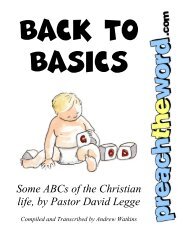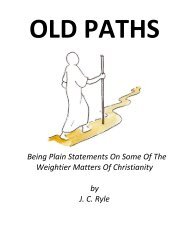Amos - The God Of Justice - Preach The Word
Amos - The God Of Justice - Preach The Word
Amos - The God Of Justice - Preach The Word
Create successful ePaper yourself
Turn your PDF publications into a flip-book with our unique Google optimized e-Paper software.
THE GOD OF JUSTICE<br />
David Legge<br />
Do you know something? <strong>God</strong> is roaring today. He is roaring against the Western<br />
world that lives in relative peace, the Western world that is up to its neck in capitalism<br />
and is wealthy and prosperous, the Western world that is living in luxury. <strong>God</strong> is<br />
roaring at a wealthy people, and much of that people has enough religion to drown<br />
themselves! <strong>God</strong> is roaring at a people in the West, even who take the name of Christ,<br />
who have wealth, and who have religion, but neither affects their lives to make any<br />
difference in the communities in which they live - a people for whom making money<br />
has become more important than worshipping <strong>God</strong>! <strong>The</strong> <strong>God</strong> of justice is roaring, can<br />
you hear Him? He is roaring to get the attention of the nations of our modern world,<br />
just like He did the nations roundabout Israel in <strong>Amos</strong>' day - but no one is listening!<br />
Maybe that's why you can't hear Him tonight.<br />
It says here in verse 2: 'He utters His voice from Jerusalem' - that's very significant.<br />
Where was <strong>Amos</strong>? He was up north in Israel, he was at Bethel. Jerusalem was down in<br />
the south in Judah. What <strong>Amos</strong> was saying was: though Israel is the Northern<br />
Kingdom, they had established their own way of religion, their own religious centres of<br />
worship in Dan and Bethel and Gilgal, they had devised their own approach to <strong>God</strong>,<br />
but the prophet of <strong>God</strong> was reminding these people that <strong>God</strong> has not changed. <strong>The</strong>y<br />
may have changed location, they may have changed their inclinations as to how they<br />
felt they should worship <strong>God</strong>, but <strong>God</strong> had not changed - He was still roaring from<br />
Jerusalem! What a message for the world in which we live. I believe <strong>God</strong> would be<br />
reminding the nations roundabout this world of ours that all roads do not lead to <strong>God</strong>.<br />
<strong>The</strong>re is great pressure for us today in the 21st-century to accept that teaching. We<br />
live in a pluralistic, politically correct society - but <strong>God</strong> roars today, still from<br />
Jerusalem, and this holy <strong>God</strong> that we've been hearing about in the mornings, this <strong>God</strong><br />
of justice, He is still a jealous <strong>God</strong> who will have no other gods before Him. That's the<br />
first commandment, and you know that's New Testament teaching - 2 Timothy 2:5:<br />
'For there is one <strong>God</strong> and one Mediator between <strong>God</strong> and men, the Man Christ Jesus'.<br />
Well, <strong>Amos</strong> begins each of his indictments in this manner. If you look at it, you see it<br />
in verse 3 of chapter 1 and all the rest of the judgements against these nations, he<br />
says: 'For three transgressions, and for four, I will not turn away its punishment'. Now<br />
that's a strange expression, 'for three transgressions, and for four', and it's really<br />
what we call an idiom, an expression of language that doesn't equate exactly. So what<br />
<strong>Amos</strong> is not saying is that these nations each committed three or four transgressions<br />
literally, it's a term that is used for an indefinite number of transgressions that had<br />
finally come to an end. In fact, the Bible teaches that before <strong>God</strong> the nations have a<br />
cup of wrath, and that wrath comes to overflowing and then <strong>God</strong> executes judgement.<br />
We praise <strong>God</strong> that He is long-suffering, but this expression teaches us that even His<br />
patience comes to an end. You see, to try <strong>God</strong>'s patience is to tempt the Lord, and<br />
when we try <strong>God</strong>'s patience and tempt the Lord we're inviting judgement. I hope<br />
there is no one here tonight, maybe someone who has wandered in, come with a<br />
friend and you're not a Christian, and you've heard the gospel many many times, or<br />
maybe you're in a backslidden state, and you're trying the patience of <strong>God</strong>, you're<br />
tempting <strong>God</strong>. Do you know what you're doing? You're inviting His judgement. It's as<br />
if you're saying, like the wee fellow on the football pitch: 'Come on! Come on and get<br />
7














